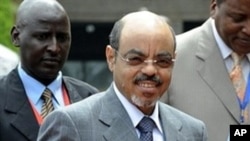Ethiopia's sparsely-populated Tigray region is shaping up as the focal point for the May 23rd elections for parliament. Tigray contributes only 6 percent of Ethiopia's 80 million people. But, it could hold the key to the country's political future.
Tigray might well be called Ethiopia's battleground state, in more ways than one.
A homegrown rebel group, the Tigray People's Liberation Front, or TPLF, waged a guerrilla war in the 1970s and 80s that toppled the country's Soviet-backed military regime. During the war, Tigray was the epicenter of a famine that killed as many as a million people. It was also the front-line state in a war against Eritrea from 1998-2000, which claimed another 70,000 lives.
Today, the TPLF's leaders are Ethiopia's leaders. They comprise the core of the ruling Ethiopian People's Revolutionary Democratic Front (EPRDF), starting with Prime Minister Meles Zenawi.
But with elections 2.5 weeks away, Tigray is again a battleground. After 19 years in power, the ruling party is facing its first significant electoral challenge in its stronghold. Moreover, it is a challenge from within, led by members of a breakaway TPLF faction.
The opposition's attack is aimed at two sensitive and emotional issues: the concept of Revolutionary Democracy that is the heart of the ruling party's ideology; and the troubled relationship with neighboring Eritrea.
Opposition spokesman and candidate for Tigray's regional parliament, Berhanu Berhe, calls Revolutionary Democracy a Marxist-Leninist recipe for a one-party dictatorship.
"Revolutionary Democracy is an ideology that categorizes society into class. Then some of the classes are enemies, the others are friends," said Berhe. "That is class analysis. And this class analysis is basically Leninist policy. Then this policy will crush the enemies using the friendly classes, and this does not work. The failure of the Soviet Union was this."
Aregash Adane was one of the TPLF's top women fighters during what is known as the 'armed struggle'. She is the opposition candidate challenging Prime Minister Meles.
Aregash once shared the dream of a revolutionary democratic state bringing justice and economic development to Ethiopia. She says 19 years of bitter experience has shown otherwise.
"We have to learn from our experiences. This is not a short period. And I do not think this Revolutionary Democracy will bring basic change in our country," she said. "It has proved a failure. Do we have to stay another 19 years to understand there is a failure in our country by the leadership of Revolutionary Democracy."
Criticism of Revolutionary Democracy infuriates ruling party officials. They call talk of dictatorship a 'ridiculous allegation' for which opposition leaders may be called to account after the election.
TPLF political chief, Tedros Hagos, says the question of who is right and who is wrong will be decided by voters.
"They have to prove why EPRDF is a dictatorship. It is an elected party. Ultimately, who's going to judge whether this government is a dictator or not is the people," said Tedros.
Tedros accuses opposition groups of making outrageous allegations to whip up passions among their supporters.
"They think allegation is a campaign tactic for their ultimate strategy, a strategy to instigate violence," said Tedros. "To remove the EPRDF through street violence."
Opposition leaders categorically deny favoring violence. They say any outbreak would be a setback to their strategy of building a strong base in the ruling party's back yard.
The ruling party has pledged to keep the peace, and authorities have invested in riot gear they hope will quell any threat to public order.
Nevertheless, a drive across Tigray revealed clear evidence of rising tensions. Virtually every opposition campaign poster had been torn or defaced, even in areas considered opposition strongholds.
A few scattered incidents of violence have been reported, one of them fatal. But police say they are prepared to prevent the kinds of protests the ended in violence following the last national election in 2005.
Tigray is again a battleground, but as in the past, the TPLF is expected to emerge victorious. Given its near total control of the government, experts say the region's ruling party could sweep the boards.
The opposition is hoping it can awaken a sleeping giant of anti-government sentiment. But even its staunchest supporters understand this struggle is about building for the future. They may dream, but the most they can realistically hope for is to live to fight another day.




